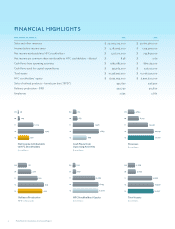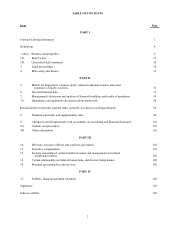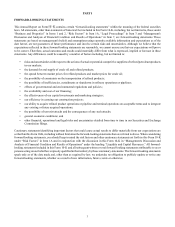HollyFrontier 2013 Annual Report Download - page 18
Download and view the complete annual report
Please find page 18 of the 2013 HollyFrontier annual report below. You can navigate through the pages in the report by either clicking on the pages listed below, or by using the keyword search tool below to find specific information within the annual report.
10
The Tulsa West facility is located on a 750-acre site in Tulsa, Oklahoma situated along the Arkansas River. The principal processing
units at the Tulsa West facility consist of crude and vacuum distillation (with light ends recovery), naphtha hydrodesulfurization,
catalytic reforming, propane de-asphalting, lubes extraction, MEK dewaxing, delayed coker and butane splitter units. Most of the
operating units at the facility currently in service were built in the late 1950s and early 1960s. The refinery was reconfigured to
emphasize specialty lubricant production in the early 1990s. Tulsa West facility's Supporting Infrastructure includes approximately
3.2 million barrels of feedstock and product tankage, of which 0.4 million barrels of tankage is owned by Plains All American
Pipeline, L.P. (“Plains”).
The Tulsa East facility is located on a 466-acre site also in Tulsa, Oklahoma situated along the Arkansas River. The principal
process units at the Tulsa East facility consist of crude and vacuum distillation, naphtha hydrodesulfurization, FCC, isomerization,
catalytic reforming, alkylation, scanfiner, diesel hydrodesulfurization and sulfur units. The Tulsa East facility's Supporting
Infrastructure includes approximately 3.4 million barrels of tankage owned by HEP.
Markets and Competition
The primary markets for the El Dorado Refinery's refined products are Colorado and the Plains States, which include the Kansas
City metropolitan area. The gasoline, diesel and jet fuel produced by the El Dorado Refinery are primarily shipped via pipeline
to terminals for distribution by truck or rail. We ship product via the NuStar Pipeline Operating Partnership L.P. Pipeline to the
northern Plains States, via the Magellan Pipeline Company, L.P. (“Magellan”) mountain pipeline to Denver, Colorado, and on the
Magellan mid-continent pipeline to the Plains States.
The El Dorado Refinery faces competition from other Plains States and Mid-Continent refiners, but the principal competitors for
the El Dorado Refinery are Gulf Coast refiners. Although our Gulf Coast competitors typically have lower production costs because
of economies of scale, we believe that our competitors' higher refined product transportation costs allow our El Dorado Refinery
to compete effectively in the Plains States and Rocky Mountain region with the Gulf Coast refineries.
For the year ended December 31, 2013, sales to Shell Oil Products US (“Shell”) represented approximately 27% of the El Dorado
Refinery's total sales and 9% of our total consolidated sales. We have an offtake agreement with Shell under which Shell purchases
gasoline, diesel and jet fuel production of the El Dorado Refinery at market-based prices through the end of 2014 primarily to
support its branded and unbranded marketing network. We market gasoline and diesel primarily in Denver and throughout the
Plains States.
The Tulsa Refineries primarily serve the Mid-Continent region of the United States. Distillates and gasolines are primarily delivered
from the Tulsa Refineries to market via pipelines owned and operated by Magellan. These pipelines connect the refinery to
distribution channels throughout Colorado, Oklahoma, Kansas, Missouri, Illinois, Iowa, Minnesota, Nebraska and Arkansas.
Additionally, HEP's on-site truck and rail racks facilitate access to local refined product markets.
In conjunction with our acquisition of the Tulsa East facility in 2009, we entered a five-year offtake agreement through November
2014 with an affiliate of Sinclair whereby Sinclair purchases 45,000 to 50,000 BPD of gasoline and distillate products at market
prices from us to supply its branded and unbranded marketing network throughout the Midwest. Upon expiration, the offtake
agreement can be renewed by Sinclair for an additional five-year term. For the year ended December 31, 2013, sales to Sinclair
represented approximately 36% of the Tulsa Refineries' total sales and 11% of our total consolidated sales.
The Tulsa Refineries' principal customers for conventional gasoline include Sinclair, other refiners, convenience store chains,
independent marketers and retailers. Sinclair, truck stop operators and railroads are the primary diesel customers. Jet fuel is sold
primarily for commercial use. The refinery's asphalt and roofing flux products are sold via truck or railcar directly from the
refineries or to customers throughout the Mid-Continent region primarily to paving contractors and manufacturers of roofing
products.
Our Tulsa West facility also produces specialty lubricant products sold in both commercial and specialty markets throughout North
America and to customers with operations in Central America and South America. The specialty lubricant products are high value
products that provide a significantly higher margin contribution to the refinery. Base oil customers include blender-compounders
who prepare the various finished lubricant and grease products sold to end users. Agricultural products are formulated as
supplemental carriers for herbicides and as Environmental Protection Agency (“EPA”) registered pesticide oils, are sold to product
formulators. Process oil customers include rubber and chemical industry customers. Specialty waxes are sold primarily to packaging
customers as coating material for paper and cardboard, and to non-packaging customers in the construction materials, adhesive
and candle-making markets. Our production represents approximately 6% of paraffinic oil capacity and 13% of wax production
capacity in the United States market and is one of four refineries of specialty aromatic oils in North America.
Table of Content
























